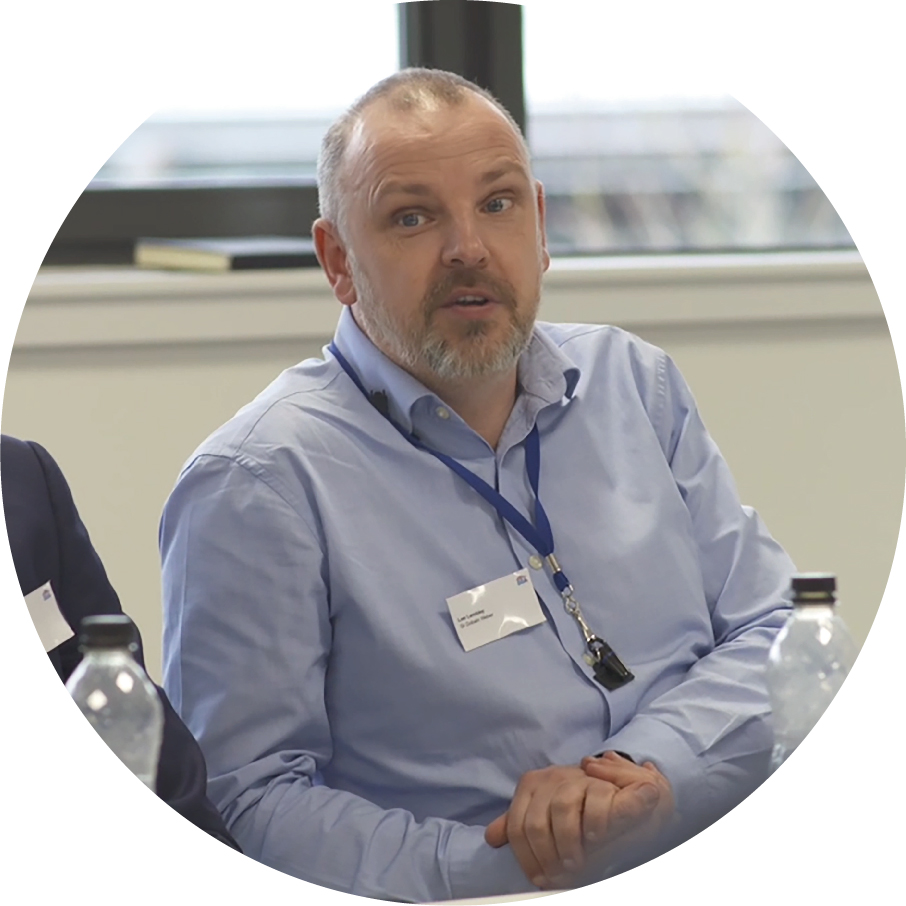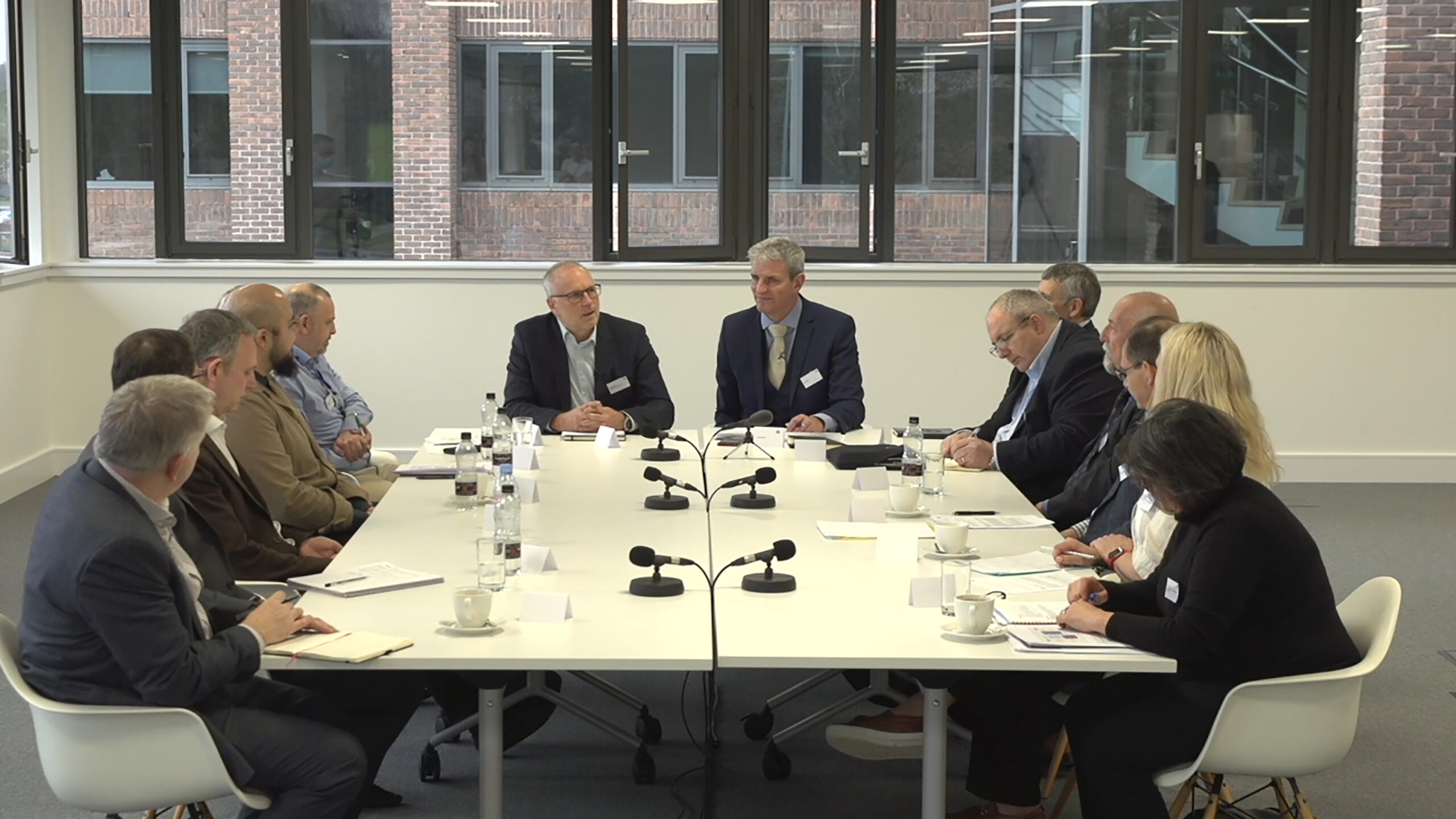What are the data trends creating industry disruption, and what’s the importance of keeping up with AI developments and computing?
Jonathan Williams, Xerini:
“One of the biggest drivers of data and upsetting the status quo especially in construction and engineering is digital twins. Digital twins has become a massive thing in construction and allows us to take an asset and model that digitally in many different ways and dimensions across the whole lifecycle from inception and design through to build and operate. This has taken the industry by storm in the last 10 years and it’s going to continue to be very important for all of the industry to get involved with. I think the BBA can get involved with it too in terms of certifying the models and algorithms in digital twins to produce data and whether testing data can be fed into digital twins for example, providing questions over intellectual property and security are met. The whole point about the interconnected connectivity of the physical world into the digital world is only going to drive innovation and the challenge that we have with taking huge amounts of data that’s out there.”

Lee Lambley, Weber:
“We need to start thinking about procurement which remains quite traditional. We’ve talked quite a lot around the traditional way we build but we’ve also got a traditional way of how we procure projects and procure buildings. As you know we’ve got a scheme we’re bringing a quantity surveyor in and it’s been raised today that we will effectively look at the cost which is around the cost of the material and the cost of the install but how then do you subjectively then place that with speed and then you’ve got the risk that comes into it as well so he’s trying balance all that and we tend to go back to what we’re comfortable with. I think we do sort of take two steps forward and one back I’ve been in this industry 20 to 30 years and that’s pretty much what we’ve done time and time again so it would be nice if we could go two steps forward and then another two steps forward it would be a good development if we could start to get there.”

John Leake, SciTech:
“It’s all about understanding what is ‘the art of the possible’ and applying it into industry challenges that might be particularly relevant for the construction sector. I think the second thought I have about kind of emerging technologies is thinking a lot about what’s happening in the world of headsets – internet connected headsets is allowing experts to actually evaluate, verify and validate some of the installation for example of particular technologies and it doesn’t have to be in terms of oculus headsets or Microsoft headsets actually our mobile phones now are connected devices that can be doing a lot of that through secure, authenticated platforms and a lot of that technology is already out there.
When I started out in this role 10-15 years ago we were talking about the world of cloud technologies and cloud solutions and nobody really understood what that was they probably thought it was something that was out of the space sector but it actually permeates every part not only of our working life but actually our home life as well from the light of internet banking and so on. I’m kind of a bit more optimistic that a lot of these new technologies will start to permeate the way that we live and we will absorb them in ways that we’ve become quite familiar with and trust. We see it already with the likes of Alexa, Google and Hive and so on that those types of technologies that are often using AI are actually something that sits within our own home and many people use it on a daily basis. I think it will come, it will take time and like I say with cloud technologies it probably took a good 10-15 years but I suspect that we will see it here and particularly with my children’s generation they’ve grown up with it so they will actually embrace it and absorb it in many ways and with a level of trust and probably better understanding than I’ve got.”

Share This Story, Choose Your Platform!
Related Roundtables
What are the data trends creating industry disruption, and what’s the importance of keeping up with AI developments and computing?
Jonathan Williams, Xerini:
“One of the biggest drivers of data and upsetting the status quo especially in construction and engineering is digital twins. Digital twins has become a massive thing in construction and allows us to take an asset and model that digitally in many different ways and dimensions across the whole lifecycle from inception and design through to build and operate. This has taken the industry by storm in the last 10 years and it’s going to continue to be very important for all of the industry to get involved with. I think the BBA can get involved with it too in terms of certifying the models and algorithms in digital twins to produce data and whether testing data can be fed into digital twins for example, providing questions over intellectual property and security are met. The whole point about the interconnected connectivity of the physical world into the digital world is only going to drive innovation and the challenge that we have with taking huge amounts of data that’s out there.”

Lee Lambley, Weber:
“We need to start thinking about procurement which remains quite traditional. We’ve talked quite a lot around the traditional way we build but we’ve also got a traditional way of how we procure projects and procure buildings. As you know we’ve got a scheme we’re bringing a quantity surveyor in and it’s been raised today that we will effectively look at the cost which is around the cost of the material and the cost of the install but how then do you subjectively then place that with speed and then you’ve got the risk that comes into it as well so he’s trying balance all that and we tend to go back to what we’re comfortable with. I think we do sort of take two steps forward and one back I’ve been in this industry 20 to 30 years and that’s pretty much what we’ve done time and time again so it would be nice if we could go two steps forward and then another two steps forward it would be a good development if we could start to get there.”

John Leake, SciTech:
“It’s all about understanding what is ‘the art of the possible’ and applying it into industry challenges that might be particularly relevant for the construction sector. I think the second thought I have about kind of emerging technologies is thinking a lot about what’s happening in the world of headsets – internet connected headsets is allowing experts to actually evaluate, verify and validate some of the installation for example of particular technologies and it doesn’t have to be in terms of oculus headsets or Microsoft headsets actually our mobile phones now are connected devices that can be doing a lot of that through secure, authenticated platforms and a lot of that technology is already out there.
When I started out in this role 10-15 years ago we were talking about the world of cloud technologies and cloud solutions and nobody really understood what that was they probably thought it was something that was out of the space sector but it actually permeates every part not only of our working life but actually our home life as well from the light of internet banking and so on. I’m kind of a bit more optimistic that a lot of these new technologies will start to permeate the way that we live and we will absorb them in ways that we’ve become quite familiar with and trust. We see it already with the likes of Alexa, Google and Hive and so on that those types of technologies that are often using AI are actually something that sits within our own home and many people use it on a daily basis. I think it will come, it will take time and like I say with cloud technologies it probably took a good 10-15 years but I suspect that we will see it here and particularly with my children’s generation they’ve grown up with it so they will actually embrace it and absorb it in many ways and with a level of trust and probably better understanding than I’ve got.”

Share This Story, Choose Your Platform!
Related Roundtables
Get in touch
Please complete the form below and we will contact you as soon as possible.
To help us to respond to your inquiry as quickly as possible, we have put a handy list of our services below.


